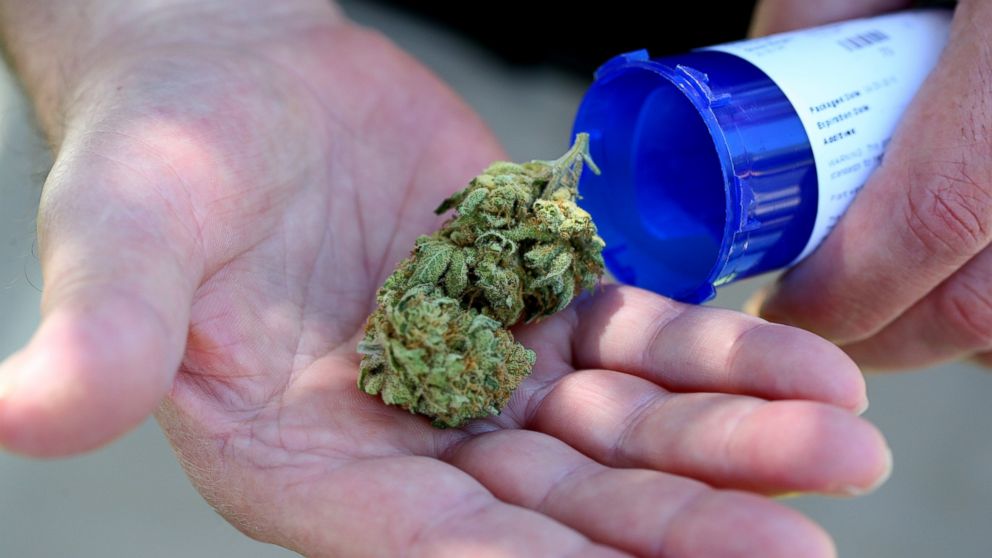Federal Reclassification of Marijuana Could Have Major Impact on Medical Uses
Marijuana is currently in the same class of drugs as heroin, LSD.

— -- Federal authorities have announced that they are reviewing the possibility of loosening the classification of marijuana, and if this happens, it could have a far-reaching impact on how the substance is used in medical settings, experts said.
Marijuana is currently classified as a Schedule I drug, meaning it is listed alongside heroin and LSD as among the "most dangerous drugs" and has "no currently accepted medical use and a high potential for abuse."
The Drug Enforcement Administration announced last week that it is reviewing the possibility of reclassifying it as a Schedule II drug, which would put it in the same category as Ritalin, Adderal and oxycodone.
Medical experts are welcoming the review, saying it could ease restrictions for researchers, so that they can better understand which compounds in marijuana could be used to help patients.
The American Medical Association told ABC News that the group supports the review "to help facilitate scientific research and the development of cannabinoid-based medicines."
"The Drug Enforcement Administration should work with other federal regulatory agencies to develop a special schedule for marijuana to facilitate study of its potential medical utility in prescription drug products," AMA officials told ABC News in a statement.
"Current standards for approval of prescription drug products require rigorous scientific study. While studies related to a limited number of medical conditions have shown promise for new cannabinoid-based prescription products, the scope of rigorous research needs to be expanded to a broader range of medical conditions for such products," the AMA added.
Dr. Kevin Hill, assistant professor of psychiatry at McLean Hospital and Harvard Medical School, published a review of medical marijuana in the Journal of the American Medical Association in 2015. In that review, he emphasized there are significant barriers for researchers who want to study marijuana for its medicinal potential.
There are "hoops you have to run through for this research," Hill told ABC News. "If you use marijuana itself, you have to get special licensing from the DEA. It involves a background visit and ... they don’t give it out very easily."
There are currently two marijuana-derived medications approved by the U.S. Food and Drug Administration, Hill noted. The active ingredients in both medications are a group of compounds known as cannabinoids, and these chemicals are approved for nerve pain and for stimulating appetite in patients undergoing cancer treatment, Hill said. However, many other people use medical marijuana or marijuana-derived compounds for a host of other conditions from epilepsy to vertigo, he said.
"We know that medical marijuana has good evidence for treatment for a handful of medical conditions," Hill said. "There are thousands of people who are using medical marijuana for a whole host of medical conditions," where the efficacy has yet to be thoroughly studied.
By changing the classification of the drug, Hill said researchers and doctors could find out how effective marijuana is in other conditions.
"We could move toward a more evidence-based use of medical marijuana," Hill said.
Hill pointed out there are around 60 known compounds in marijuana and that many have not been thoroughly studied by researchers looking for medicinal uses. A new classification will mean it will be easier for researchers to obtain licenses to examine these chemicals for medical treatments and to access suppliers, experts said.
Steph Sherer, the founder of the medical marijuana advocacy group Americans for Safe Access, said changing the classification could be a "paradigm change." She pointed out there is currently only one supplier of medical marijuana for researchers.
"It will allow more federal institutions to engage in research and allow the NIDA [National Institute on Drug Abuse] to open up its source for cannabis so there’s not just one place for researchers to use" marijuana, she explained.
The DEA along with the U.S. Department of Health and Human Services and Office of National Drug Control Policy announced they would review marijuana's classification after multiple letters from senators last year, including Sen. Elizabeth Warren, D-Massachusetts, and Sen. Kirsten Gillibrand, D-New York.
"For too long schedule I status for marijuana has been a barrier for necessary research, and as a result countless Americans can't get access to medicine they desperately need," Gillibrand said in a statement last week. "It's past due for the DEA to reconsider marijuana's status. I am hopeful that antiquated ideology won't continue to stand in the way of science and that the DEA will reschedule marijuana to schedule II."




